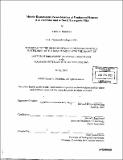Mitotic homologous recombination at engineered repeats in S. cerevisiae and in novel transgenic mice
Author(s)
Hendricks, Carrie A. (Carrie Anne), 1975-
DownloadFull printable version (9.097Mb)
Alternative title
Mitotic homologous recombination at engineered repeats in Saccharomyces cerevisiae and in novel transgenic mice
Other Contributors
Massachusetts Institute of Technology. Biological Engineering Division.
Advisor
Bevin P. Engelward.
Terms of use
Metadata
Show full item recordAbstract
Although homologous recombination provides an efficient means for repairing and tolerating DNA damage, mitotic recombination between misaligned sequences can lead to loss of genetic information (e.g. deletions, translocations and loss of heterozygosity). Given that such genetic changes may promote tumorigenesis, it is critical to identify those genetic and environmental factors that render cells susceptible to homologous recombination. Our goal is to elucidate the mechanisms of DNA damage-induced recombination and to determine the role of DNA repair enzymes in modulating homologous recombination in eukaryotic cells. Alkylating agents are abundant in our environment and are generated endogenously as normal metabolites. In addition to their mutagenic and cytotoxic effects, alkylating agents stimulate homologous recombination in eukaryotic cells. Removal of alkylated bases by DNA glycosylases, such as the Magl 3-methyladenine (3MeA) DNA glycosylase, initiates the base excision repair (BER) pathway. To investigate the molecular basis for methylation-induced homologous recombination in S. cerevisiae, intrachromosomal recombination was measured under conditions where MAGI expression levels were varied. Cells lacking Magl show increased susceptibility to methylation-induced recombination, suggesting that unrepaired 3MeA lesions induce recombination. Overexpression of M4GI also elevates recombination levels, presumably due to the accumulation of recombinogenic BER intermediates. (cont.) To study the relative importance of specific DNA repair enzymes in modulating recombination in mammals, we have engineered transgenic mice that make it possible to quantify homologous recombination events in primary somatic cells, both in vitro and in vivo. The FYDR (fluorescent yellow direct repeat) mice carry two different mutant copies of an expression cassette for enhanced yellow fluorescent protein (EYFP) arranged in a direct repeat. Homologous recombination between these truncated sequences restores expression of EYFP. Using flow cytometry, spontaneous and DNA damage-induced recombination events were quantified in primary fibroblasts cultured from embryonic and adult tissues. In addition, recombination events that occurred in vivo were detected directly in disaggregated skin cells. Currently, FYDR mice are being crossed with mice carrying engineered defects to determine how specific gene traits modulate susceptibility to mitotic recombination. Ultimately, this tool will help us better understand how environmental agents and specific genes influence cellular susceptibility to cancer-promoting recombination events in mammals.
Description
Thesis (Ph. D. in Genetic Toxicology)--Massachusetts Institute of Technology, Biological Engineering Division, 2003. Includes bibliographical references.
Date issued
2003Department
Massachusetts Institute of Technology. Department of Biological EngineeringPublisher
Massachusetts Institute of Technology
Keywords
Biological Engineering Division.